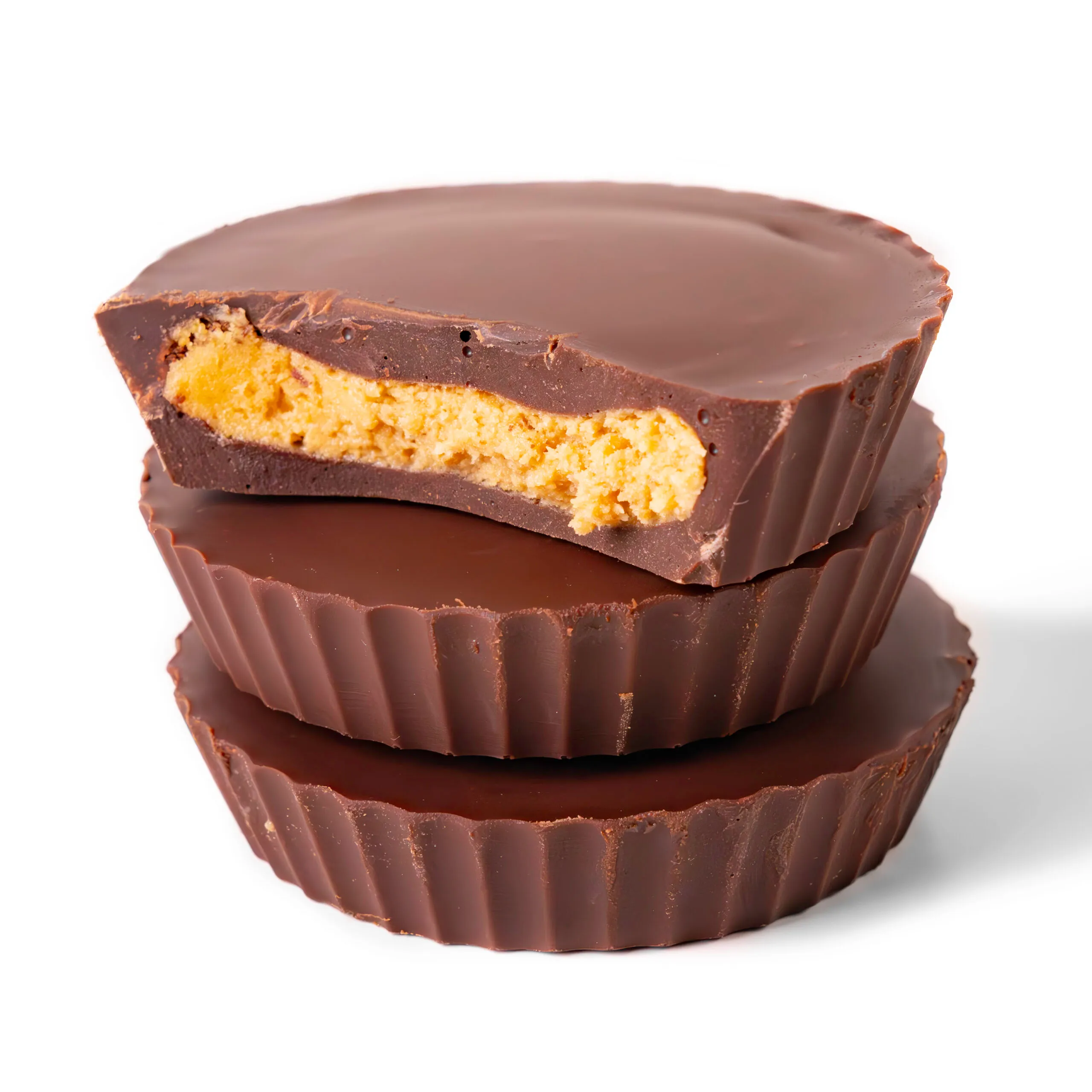Halloween is just around the corner, and the temptation of sweet treats can be hard to resist. We're putting your favorite candies head-to-head with healthier alternatives in this year’s Signos’ Candy Battle series to help you navigate this spooky season.
When choosing between Reese's Peanut Butter Cups and SkinnyDipped Dark Chocolate Cups, your decision will largely hinge on your personal preferences and dietary restrictions. Both treats have unique appeal but cater to different tastes and nutritional needs.
Reese's Peanut Butter Cups is the leading brand in the chocolate and peanut butter industry. This candy is a classic American confection known for its irresistible combination of creamy peanut butter and milk chocolate. They are a fan favorite due to their rich, sweet, and slightly salty flavor profile. On the other hand, SkinnyDipped Dark Chocolate Cups offer a more modern twist, featuring a blend of almond butter encased in a layer of dark chocolate. These cups are often marketed as healthier, emphasizing lower sugar content and higher quality ingredients.
This article will delve into the key differences between Reese's Peanut Butter Cups and SkinnyDipped Dark Chocolate Cups, focusing on nutrition, dietary considerations, and overall taste.

What Is The Difference Between Reese's Peanut Butter Cups And SkinnyDipped Dark Chocolate Cups?
Reese's Peanut Butter Cups are a beloved candy consisting of a smooth peanut butter filling in milk chocolate. Known for their sweet and salty taste, they offer a rich, creamy texture that appeals to many. Nutritionally, Reese's cups are relatively high in sugar and fat, with each standard cup containing about 105 calories, 6 grams of fat,12 grams of carbohydrates, and 11 grams of sugar. They are also notable for containing common allergens such as peanuts and dairy, which may pose consumption restrictions for those with allergies or lactose intolerance.1
SkinnyDipped Dark Chocolate Cups, in contrast, feature a filling made from almond butter covered in a thin layer of dark chocolate. These cups are designed to focus on healthier ingredients, offering a slightly more nuanced flavor with less sweetness than Reese's. Each SkinnyDipped cup contains about 70 calories, 5 grams of fat, 6 grams of carbs, and 2 grams of sugar, reflecting their lower sugar content and emphasis on higher-quality ingredients. They are gluten-free, made with unsweetened chocolate, cocoa butter, and sea salt. Additionally, they are free from artificial preservatives, making them suitable for those with specific dietary needs or preferences.2
In summary, while Reese's Peanut Butter Cups are cherished for their classic taste and texture, they have a higher sugar and calorie content. SkinnyDipped Dark Chocolate Cups, on the other hand, cater to those seeking a healthier option with fewer sugars and a different flavor profile, though they may have a slightly higher price point.
Which One Is Better: Reese’s Peanut Butter Cups or SkinnyDipped Dark Chocolate Cups?
When weighing the choice between Reese's Peanut Butter Cups and SkinnyDipped Dark Chocolate Cups, the "better" option largely depends on your dietary priorities and taste preferences. Reese's Peanut Butter Cups, a perennial favorite, offer a classic indulgence with a smooth, creamy peanut butter center surrounded by milk chocolate. While they deliver an iconic flavor, their higher sugar content and fat may be a drawback for those conscious of their calorie intake or with dietary restrictions related to sugar or dairy.
On the other hand, SkinnyDipped Dark Chocolate Cups presents a modern twist with a focus on healthier ingredients. SkinnyDipped cups do not contain palm oil, sugar alcohols, or artificial sweeteners, which might appeal to those with specific dietary needs. These cups also have cane sugar instead of the table sugar and dextrose contained in the Reese’s Peanut Butter Cups. Despite their higher price, the nutritional benefits and unique flavor profile make them a compelling choice for health-conscious consumers.
SkinnyDipped Dark Chocolate Cups also contain dark chocolate, which is a polyphenol-rich food, meaning it can improve your overall health on many levels. Dark chocolate can alter glucose metabolism, improve insulin sensitivity, and reduce oxidative stress. Some benefits of dark chocolate include:
- Improving blood flow and lowering blood pressure
- Lowering cholesterol levels3
- Improving attention and memory4
- Reducing the risk of heart disease5
If you prioritize traditional taste and don't mind a bit of extra sugar and fat, Reese's Peanut Butter Cups may be your go-to. However, if you seek a healthier option with fewer sugars and potential dietary benefits, SkinnyDipped Dark Chocolate Cups could be the better choice.
Nutrition
When deciding which candy is "better," various factors such as nutritional value, taste preference, and dietary restrictions come into play. Reese’s Peanut Butter Cups are beloved for their classic flavor, but they have a higher carb and fat count. This makes them a more indulgent choice with a higher calorie count and more sugar.
In contrast, SkinnyDipped Dark Chocolate Cups offer a healthier profile. Their lower sugar content and use of higher-quality ingredients make them a better option for those mindful of sugar intake and overall health. The main takeaway is that while Reese’s provides a traditional taste, SkinnyDipped’s nutritional benefits make it the healthier choice.
Glycemic Index
The glycemic index (GI) measures how quickly a food raises blood sugar levels. With their high sugar content, Reese’s Peanut Butter Cups tend to have a higher glycemic index, meaning they can cause a rapid spike in blood glucose levels. This is largely due to their milk chocolate coating and sweetened peanut butter filling, which contribute to a higher GI.
In contrast, SkinnyDipped Dark Chocolate Cups are designed with healthier ingredients, including less sugar and more natural sweeteners, contributing to a lower glycemic index. While exact GI values for SkinnyDipped products aren't specified, their reduced sugar content suggests they will gradually impact blood sugar more than Reese’s. The SkinnyDipped website states, “Our products aim to provide a satisfying treat while minimizing blood sugar spikes, thanks to our focus on lower sugar content and better quality ingredients."
Learn More About Healthy Eating and Nutrition with Signos’ Expert Advice
Signos is a great resource for expert advice on nutrition and healthy eating. Signos has a team of registered dietitians who compile evidence-based nutrition information to help you improve your health and wellness. Check out the resources here.
Signos CGM empowers you to improve your health by keeping track of your diet, exercise, sleep habits, and blood sugar. Knowledge is power, and a CGM can give you specific information about how your habits affect your health.
Find out if Signos is a good fit for you by taking a quick quiz.
Sign up to be the first to know about special offers and exciting Signos news.
References
- Hershey Company. (2024). Reeses milk chocolate peanut butter cups. https://www.hersheyland.com/reeses
- SkinnyDipped. (2024). Cups, dark chocolate peanut butter. https://skinnydipped.com/collections/cups/products/dark-chocolate-peanut-butter-cups
- Darand, M., Hajizadeh Oghaz, M., Hadi, A., Atefi, M., & Amani, R. (2021). The effect of cocoa/dark chocolate consumption on lipid profile, glycemia, and blood pressure in diabetic patients: A meta-analysis of observational studies. Phytotherapy research : PTR, 35(10), 5487–5501. https://doi.org/10.1002/ptr.7183
- Nemoto, K., Kokubun, K., Ogata, Y., Koike, Y., Arai, T., & Yamakawa, Y. (2022). Dark Chocolate Intake May Reduce Fatigue and Mediate Cognitive Function and Gray Matter Volume in Healthy Middle-Aged Adults. Behavioural neurology, 2022, 6021811. https://doi.org/10.1155/2022/6021811
- Hooper, L., Kay, C., Abdelhamid, A., Kroon, P. A., Cohn, J. S., Rimm, E. B., & Cassidy, A. (2012). Effects of chocolate, cocoa, and flavan-3-ols on cardiovascular health: a systematic review and meta-analysis of randomized trials.The American journal of clinical nutrition, 95(3), 740–751. https://doi.org/10.3945/ajcn.111.023457




.svg)
.svg)
.svg)
.svg)
.svg)
.svg)
.svg)
.svg)
